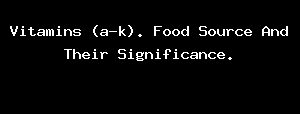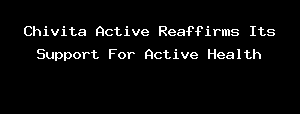Succjay
Business Person : I Am An Honest Person
Wants to meet Just Friends
Articles
302
Followers
37
profile/3073IMG_20200914_113434_467.jpg
Succjay

Vitamins (a-k). Food Source And Their Significance.
~5.6 mins read
Pls, This is a lengthy writeup with full exposition on vitamins.
Types of vitamins
There are two types of vitamins:
water-soluble vitamins B and C
fat-soluble vitamins A, D, E and K.
Water-soluble vitamins cannot be stored in the body, so you need to get them from food every day. They can be destroyed by overcooking.
Vitamins and minerals are found in a wide variety of foods and a balanced diet should provide you with the quantities you need.
VITAMIN A (retinol)
This vitamin is essential for growth and healthy skin and hair.
It is a powerful antioxidant that plays a key role in the body's immune system.
Vitamin A is found in the following animal PRODUCTS:
milk, butter, cheese and eggs
chicken, kidney, liver, liver pate
fish oils, mackerel, trout, herring.
Another source of vitamin A is a substance called beta-carotene.
This is converted by the body into vitamin A. It is found in orange, yellow and green vegetables and fruits.
VITAMIN B complex
The complex of B vitamins includes the following group of substances:
B1 – thiamine
B2 – riboflavin
B3 – nicotinic acid
B6 – pyridoxine
B12 – cobalamin
folate – folic acid.
The body requires relatively small amounts of vitamins B1, B2 and B3.
Vitamins B6 and B12 help the body to use folic acid and are vital nutrients in a range of activities, such as cell repair, digestion, the production of energy and in the immune system.
Vitamin B12 is also needed for the breakdown of fat and carbohydrate.
Deficiency of either vitamin will result in anaemia .
VITAMIN B6 is found in most foods, so deficiency is rare.
Vegetarians and B12
Vegetarians who eat eggs and dairy produce will get enough B12.
VITAMIN B12 deficiency can occur in vegans because all dietary sources are animal in origin.
The British Vegan Society recommends foods fortified with vitamin B12, such as:
breakfast cereals
yeast extract
margarine
soya powder and milk
Plamil products
soya mince or chunks.
The best dietary sources of the B vitamins, especially B12, are:
animal products (meat, poultry)
yeast extracts (brewers' yeast, Marmite).
Other good sources include:
asparagus, broccoli, spinach, bananas, potatoes
dried apricots, dates and figs
milk, eggs, cheese, yoghurt
nuts and pulses
fish
brown rice, wheat germ, wholegrain cereals.
Dietary sources of vitamin B6 are similar to those for vitamin B12 and also include avocado, herring, salmon, sunflower seeds and walnuts.
Folic acid (folate)
Folic acid works closely in the body with vitamin B12. It is vital for the production of healthy blood cells.
Lack of folic acid is one of the main causes of anaemia, particularly in people whose diet is generally poor.
Vitamins B6 and B12 help the body use folate, so are often given alongside folic acid supplements.
In pregnancy, low folate levels increase the risk of the baby's spinal cord system not developing completely (spina bifida).
All women are now advised to take folic acid supplements in the first three months of pregnancy and ideally before conception occurs.
Folate occurs naturally in most foods but often in small amounts.
Many food manufacturers now fortify white flour, cereals, bread, corn, rice and noodle products with folic acid.
One serving of each enriched product will contribute about 10 per cent of the RDA for folic acid.
Wholegrain products are not enriched because they already contain natural folate.
Liver contains the greatest amount of folic acid, with lower levels found in beef, lamb and pork and a range of green vegetables and citrus fruits.
Other sources of folate are dried beans, fresh orange juice, tomatoes, wheat germ (wholemeal bread and cereal) and wholegrain products (pasta and brown rice).
Table 1 :Folate content of foods – an adult needs 200mcg a day.
VITAMIN C
Vitamin C is one of the most potent antioxidant vitamins.
We need vitamin C for growth, healthy body tissue, wound repair and an efficient immune system.
In addition, it also helps with the normal function of blood vessels and helps you absorb iron from plant sources as opposed to the iron in red meat.
Did you know?
Frozen and tinned produce count towards your
five-a-day .
Fresh fruit and vegetables are the main source of vitamin C – eating your five a day will easily meet the body's needs.
Too much vitamin C can result in a sensitive, irritable stomach and mouth ulcers.
Also, too much of a good thing can be dangerous; the upper daily limit is currently 1g.
More than this safe level of vitamin C has been linked to damage of the inner lining of arteries, predisposing to the formation of cholesterol plaques and heart disease.
Table 2: Vitamin C content of foods – an adult needs 60mg a day.
VITAMIN D (calciferol)
Vitamin D is essential for healthy bones and teeth. It helps the body to absorb calcium.
The action of sunlight on the skin enables the body to manufacture vitamin D – even on a cloudy day. For this reason, most people will get enough vitamin D through their everyday activities. However, there are some groups of people who are at risk of vitamin D deficiency and the Department of Health recommends that the following people take a daily vitamin D supplement:
pregnant and breastfeeding women
infants and children under five years old
people over 65 years old
people who have very little sun exposure, for example people who cover their skin for cultural reasons and people who are housebound or have to stay indoors for long periods of time
people who have darker skin and so are not able to make as much vitamin D, for instance people of African, African-Caribbean or South Asian origin.
Your doctor or pharmacist can give you advice on suitable supplements.
Foods rich in vitamin D are oily fish, liver, cod liver oil and dairy products.
Many foods are also 'fortified' with low levels of vitamin D, such as margarine and breakfast cereals.
However, it is very difficult to get the recommended daily amount of vitamin D through diet alone and an increasing amount of vitamin D deficiency is being detected with more frequent blood testing of susceptible or symptomatic people.
VITAMIN E
Vitamin E is important in cell maintenance and also plays an active role in the maintenance of a healthy heart, blood and circulation. It is one of the body's main antioxidants.
Deficiency only occurs in cases of severe malabsorption or certain rare genetic disorders.
The following foods are rich in vitamin E:
avocados, tomatoes, sweet potatoes, spinach, watercress, brussels sprouts
blackberries, mangoes
corn oil, olive oil, safflower oil, sunflower oil
mackerel, salmon
nuts, wholemeal and wholegrain products.
VITAMIN K
Vitamin K is involved in the blood clotting process and in the maintenance of strong bones. It is found in small quantities in meat, most vegetables and wholegrain cereals.
Your body also makes vitamin K in the large intestine, through the activity of 'healthy bacteria'. For this reason, there is no recommended daily amount.
These bacteria are also referred to as the gut flora. They form part of our defence against more harmful organisms.
Diets rich in fatty and sugary foods can adversely change the balance of the gut flora, as can the additives and pesticides that are often a part of modern food production.
profile/3073IMG_20200914_113434_467.jpg
Succjay

Chivita Active Reaffirms Its Support For Active Health
~2.1 mins read
Chivita Active, Nigeria’s leading fruit juice brand for a healthy and active lifestyle, is reinforcing its reputation of being at the forefront of encouraging consumers to embrace health and wellness. The brand has continued to do so by raising awareness and motivating consumers to adopt an active lifestyle, as the community of consumers who strive for wellness continues to grow.
In 2018, Chivita Active launched the C’mon Get Active campaign to position the brand as an enabler for a healthy, active life. Since then, the social consciousness for active health and wellness has grown steadily as more consumers integrate consumption of the nourishing Chivita Active into their daily routine, as they position it as a partner in their journey for a healthy lifestyle.
This health and wellness trend is increasingly being adopted by millions of consumers in the midst of the on-going COVID-19 pandemic. Research shows that people who drink fruit juice daily have greater energy, improved immune systems, and a reduced risk of infection and disease. As a result, they live happier, more active, more productive, and balanced lifestyles.
Drinking fruit juices like Chivita Active is a convenient way to consume fruits and vegetables that provide the essential vitamins, minerals and nutrients - Vitamin C, Magnesium, Calcium, Potassium, and Iron, which support proper function of the body’s metabolism, as well as boost normal function of the immune system.
Jide Dipeolu, a fitness instructor at the Gbagada Hospital playground, emphasized the need for Nigerians to embrace a regimen of gaining nourishment from daily juice consumption to boost the body’s immune function and promote optimum health and wellness.
“I lead a team of three fitness enthusiasts on a daily exercise routine to help them stay active and be more productive. Part of my active healthy routine includes taking a pack of Chivita Active Fruit Juice along for the exercises. Its great taste and healthy nourishment is significant to supporting my active routine and its nutrients boost proper function of my immune system,†he said.
Assistant Brand Manager, Chivita, Oladapo Olanrewaju, noted that through the C’mon Get Active campaign, the Chivita Active brand would continue to connect with and support the aspirations of consumers for living a healthy and active life.
“Since 2018 when we launched the C’mon Get Active campaign, we have raised consumer consciousness towards health and wellness. We continue to reiterate that even as we face the on-going COVID-19 pandemic, Chivita Active fruit juice supports Nigerians by providing some of the daily required vitamins, minerals, and nutrients they need to carry out their daily activities and keep their bodies nourished and healthy,†he stated.
Chivita Active fruit juice is available in two exciting blends of 6 Citrus Mixed Fruit Juice (available in 2 convenient pack sizes of 1litre and 315ml) and the Vegetable & Fruits variants, Carrot and Orange which comes in the 1L pack. Chivita Active fruit juice can be purchased from supermarkets, shopping malls, neighbourhood stores, open markets and other locations across the country.
Advertisement

Link socials
Matches
Loading...
